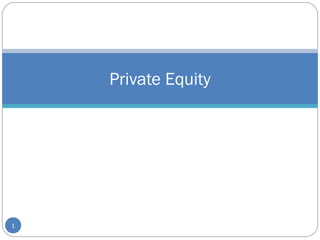
Private equity
- 2. Private equity is essentially a way to invest in some asset that isn't publicly traded, or to invest in a publicly traded asset with the intention of taking it private. Unlike stocks, mutual funds, and bonds, private equity funds usually invest in more illiquid assets, i.e. companies. By purchasing companies, the firms gain access to those companies' assets and revenue sources, which can lead to very high returns on investments. 2
- 3. Simple example: A private equity fund, ABC Capital II, borrows $9bn from a bank (or other lender). To this it adds $2bn of equity – money from its own partners and from limited partners (pension funds, rich individuals, etc.). With this $11bn it buys all the shares of an underperforming company, XYZ Industrial (after due diligence, i.e. checking the books). It replaces the senior management in XYZ Industrial, and they set out to streamline it. The workforce is reduced, some assets are sold off, etc. The objective is to increase the value of the company for a fast sale. The stock market is experiencing a bull market, and XYZ Industrial is sold two years after the buy-out for $13bn, yielding a profit of $2bn. The original loan can now be paid off with interest of say $0.5bn. The remaining profit of $1.5bn is shared among the partners. 3
- 4. Private Equity Private equity can be broadly defined to include the following different forms of investment: Leveraged Buyout: Leveraged buyout (LBO) refers to the purchase of all or most of a company or a business unit by using equity(30% Approx.) from a small group of investors in combination with a significant amount of debt(70% Approx). The targets of LBOs are typically mature companies that generate strong operating cash flow Growth Capital: Growth capital typically refers to minority equity investments in mature companies that need capital to expand or restructure operations, finance an acquisition or enter a new market, without a change of control of the company Mezzanine Capital: Mezzanine capital refers to an investment in smaller company, without taking voting control of the company. allows such companies to borrow additional capital beyond the levels that traditional lenders are willing to provide through bank loans. In compensation for the increased risk, mezzanine debt holders require a higher return for their investment Venture Capital: Venture capital refers to equity investments in less mature non-public companies to fund the launch, early development or expansion of a business 4
- 5. Private Equity – focus on LBO Although private equity can be considered to include all four of these investment activities, it is common for private equity to be the principal descriptor for LBO activity Private equity firms are considered “financial buyers” because they don’t bring synergies to an acquisition, as opposed to “strategic buyers”, who are generally competitors of a target company and will benefit from synergies when they acquire or merge with the target 5
- 6. Characteristics of a Private Equity Transaction A company or a business unit is acquired by a private equity investment fund that has secured debt and equity funding from institutional investors such as pension funds, insurance companies, endowments, fund of funds, sovereign wealth funds, hedge funds and banks, or from high net worth individuals The high debt levels utilized to fund the transaction increases the return on equity for the private equity buyer. If the target company is a public company, the buyout is “going private”. The newly private company will be resold in the future (typically 3 to 7 years) through an IPO or private sale to another company Most private equity firms’ targeted internal rate of return (IRR) during the holding period for their investment has historically been above 20% 6
- 7. Target Companies for Private Equity Transactions For an LBO transaction to be successful, the target company must generate a significant amount of cash flow to pay high debt interest and principal payments and, sometimes, pay dividends to the private equity shareholders. Here are the main characteristics: Motivated and competent management Robust and stable cash flow Low capital expenditures Asset sales and cost cutting Huge Potential 7
- 8. THANK YOU 8
